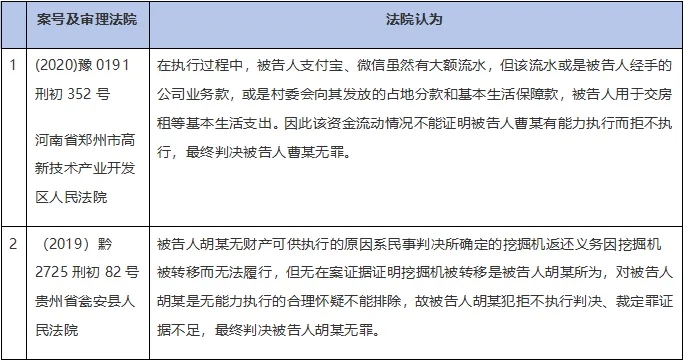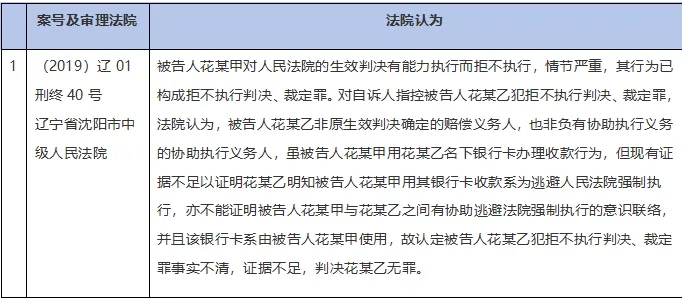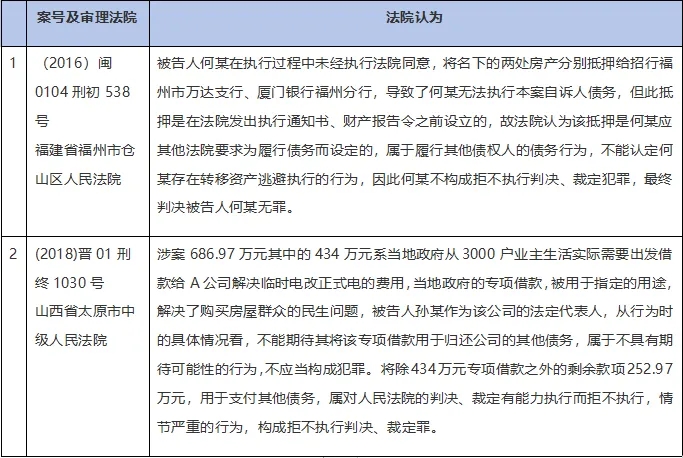Recently, the case of a company executive suspected of refusing to execute a judgment or ruling for more than 10 million yuan, represented by Wang Xintong of Beijing King&Capital Law Firm, has achieved good defense results. Under the unremitting efforts of the lawyer and the client, the procuratorate finally made a decision not to prosecute the whole case. The client regained his innocence, without affecting the business operation, and the client fully recognized and affirmed the work of the defense lawyers.
The crime of refusing to execute a judgment or ruling (hereinafter referred to as "refusing to execute") was created in order to solve the problem of difficulty in executing civil judgments and rulings, and the proportion of this crime in judicial practice was relatively low. 2018 Report of the Supreme People's Court on the Work Situation of the People's Courts in Solving the Difficulty of Execution The Report on the Work Situation of the Supreme People's Court on Solving the "Difficulty of Execution"[1] pointed out that from 2016 to September 2018, the courts nationwide sentenced 14,647 criminals for the crime of refusing to execute judgments and rulings, an average of about 5,000 people per year. In recent years, under the general trend of strengthening the implementation of China's courts and focusing on solving the problem of difficult implementation, the problem of difficult implementation has been solved to a certain extent, but the judicial practice may also be tilted in another direction, ignoring the modesty of the criminal law, and filing a case with a transfer of money without careful differentiation in the case that the executed person may not constitute a crime, which in turn leads to the executed person being pursued by the criminal case, Arrested, or even wrongly sentenced. This article will combine case experience, analysis of "refusal of execution" defense points, hope that the defense of refusal of execution to provide some reference.
First, the crime of refusing to execute the criminal composition
According to article 313 of the criminal law, the crime of refusing to execute a judgment or ruling refers to the people's court's judgment or ruling has the ability to execute but refuses to execute, the circumstances are serious, its objective behavioral elements include three aspects: first, the perpetrator of the people's court's referee has the ability to execute; second, the perpetrator refuses to execute the obligation of payment determined by the effective legal instrument; third, the perpetrator's refusal of execution causes serious consequences. Based on the past defense experience, the judgment standard of "refusing to execute when capable of executing" and "failing to execute when incapable of executing", and the specific degree of "seriousness of circumstances" are the core issues for judging the crime and non-crime. The core issue of crime and misdemeanor, but also the lawyer in the defense of the key.
Second, refuses to execute the key points of defense
(A) how to understand "have the ability to execute but refuses to execute"?
The establishment of the crime of refusing to execute, need to have evidence to prove that the perpetrator has the ability to execute but refuses to execute, that is, the perpetrator can fulfill the obligations determined by the referee instrument, but to avoid execution. The so-called ability to execute refers to the evidence verified by the people's court to prove that the person who has the obligation to execute the judgment or ruling of the people's court has property available for execution or has the ability to fulfill the obligation of a particular act. If a person does not have the ability to carry out the execution, for example, if the person obligated to carry out the execution has no property available for execution and is unable to fulfill the obligation determined by the judgment or ruling, this crime cannot be constituted.
In a specific case, to determine whether the perpetrator "has the ability to execute but refuses to do so" should be integrated with all the facts of the case, taking into account the perpetrator's own income, expenditure and other factors, and paying attention to the distinction between "having the ability to execute but refusing to do so" and "not having the ability to perform so as to fulfill the obligation". "unable to fulfill the ability to cause the failure to fulfill", for the ability to cause the failure to fulfill, subjectively no intention to evade the implementation of the expression, objectively did not commit the act of resisting the implementation of the crime shall not be recognized as a crime.
(1) No fulfillment ability does not constitute a crime
If the perpetrator does not have the ability to fulfill the judgment, that is, the perpetrator does not have the property available for execution or does not have the ability to fulfill the obligation of a particular act, it does not constitute the crime of refusing to execute. In practice, to determine whether the perpetrator has the ability to execute, not only to test the comprehensive perpetrator's own income, expenditure, etc., to consider the perpetrator's ability to implement the act of payment and the possibility of reality, but also need to focus on reviewing the evidence in the case whether to prove that the executed person has the property, whether there is evidence to prove that there is a high consumption of the executed person, whether there is evidence to prove that there is a potential claim, such as evidence is not sufficient to If the evidence is insufficient to prove that the executed person has the ability to execute, the crime of refusing to execute cannot be constituted.
According to the relevant jurisprudence, no evidence proves that the perpetrator has the ability to execute, or it is impossible to exclude the reasonable doubt that the perpetrator does not have the ability to execute, it does not constitute the crime of refusing to execute.

(2) Failure to realize that the judgment or ruling has entered into force does not constitute a crime
If the perpetrator is not aware that the judgment or ruling has come into effect, the perpetrator cannot be found to have the intention of refusing to execute the judgment or ruling that should be executed, and it does not constitute the crime of refusing to execute. However, when dealing with specific cases, for different subjects of enforcement obligations, it cannot be generalized to find that they know that they have the time matter of executing the judgment or ruling to establish the crime or not. Specifically, for the executor, the guarantor and other participants in the litigation, because of its better understanding of the specific content of the judgment, so in the judgment, the ruling has legal effect, it has to pay the property or performance of the judgment of the specific obligations, the perpetrator is aware of the judgment, the ruling has come into effect the starting point for the time of the judgment, the ruling shall be the date of the occurrence of the legal effect of the judgment. However, for the person who is obliged to assist in the execution (e.g. the custodian of the property of the executed person) and the third person, since they are not aware of the decision of the court, and they are only sure to be aware of the content of the judgment and decision after receiving the notice of assistance in execution issued by the court, the date of receiving the notice of assistance in execution from the court shall be taken as the point of time for them to realize that the judgment and decision have entered into force, and the former act at this point of time shall not be regarded as a criminal act.
According to relevant jurisprudence, if the third party does not receive the relevant execution notice from the court, it cannot be presumed that he/she knows or realizes that the judgment or ruling has entered into force, and he/she should not be obliged to assist in the execution, which cannot constitute the crime of refusing to execute.

(3) Transfer of Specialized Property (Money) Does Not Constitute a Crime
If the property transferred by the perpetrator is property that has been used for a specific purpose, and he or she disposes of or transfers the special property in accordance with the specified purpose, because the act of transferring the property has a legal basis, even if the debt determined by the court judgment is considered to have priority, the perpetrator cannot be expected to use the special property to return other debts, and therefore, it cannot be concluded that there is an act of evasion of execution, and it cannot be concluded that it constitutes the crime of refusing to execute the law.

(ii) How to define "aggravating circumstances"?
According to the criminal law, "aggravating circumstances" is one of the constituent elements of the crime of refusing to execute, if it does not reach the standard of "aggravating circumstances", even if there is a refusal to execute, it can't be punished by this crime. Regarding the specific criteria of seriousness of circumstances, the 2007 Supreme Court's Notice on Issues Relating to the Serious Investigation and Handling of Criminal Offenses of Refusing to Execute Judgments and Decisions and Violently Resisting the Court's Enforcement by Law stipulates five circumstances that constitute the crime [2], and the 2020 Supreme Court's Interpretation of Issues Concerning the Application of Law to the Trial of Criminal Cases of Refusing to Execute Judgments and Decisions stipulates " Other have the ability to implement and refused to implement, the circumstances are serious" of the eight circumstances [3], but due to the above explanation is relatively more abstract generalization, lack of overall consideration of the thinking, and easy to be affected by the policy, resulting in practice around the court for the seriousness of the grasp of the standard difference is large, whether or not to be incriminated as well as the penalty corresponding to the seriousness of the circumstances of the judgment standard is not the same. However, the size of the amount transferred by the perpetrator (or the size of the amount of refusal) is easier to judge than other circumstances, such as not reaching the aggravating circumstances of the place where the crime was committed, does not constitute a crime.
At present, the transfer of the amount of aggravating circumstances across the country to achieve the degree of transfer and there is no uniform standard, part of the region to determine the amount of refusal to implement the "aggravating circumstances" have been introduced relevant provisions, some of which are listed below:
Guangdong Province [4]: individuals up to 20,000 yuan, units up to 200,000 yuan or more;
Zhejiang Province [5]: individual or unit of more than 50,000 yuan, or less than 50,000 yuan but caused other serious consequences;
Shanghai [6]: individual refusal to reach 30,000 yuan or more, the unit reaches 300,000 yuan or more, but less than 10% of the subject matter of the implementation of the exception.
If part of the region or the temporary absence of relevant provisions on the determination of the amount of the transfer standard, it can refer to the standards of other regions. If the case is suspected of transferring a large amount, it can be considered and evaluated from the perspective of the proportion of the amount involved compared to the total amount of the subject matter of the execution, and comprehensively judged whether it belongs to the seriousness of the case.
Conclusion
After the decision of the case comes into effect or enters into the execution procedure, the executed person has the ability to execute the debt determined by the court judgment as a priority in the absence of sufficient legal reasons, if the executed person needs to use part of the incoming funds out of the consideration of maintaining the normal operation of the company or the normal life of the family, the executed person shall firstly fulfill the obligation of reporting the change of property to the court, so as to exclude The criminal risk of "having the ability to execute but refusing to execute". If inadvertently suspected of committing a crime, it is necessary for professional lawyers to intervene in the case, make an in-depth assessment of the specific circumstances of the case, and timely and comprehensive collection of evidence in favor of the party concerned, to assist the relevant judicial authorities to accurately characterize and deal with the case.
Annotation:
[1] In the People's Court Daily, October 25, 2018, page 01.
[2] 1. the executed person hides, transfers, or intentionally destroys property or transfers property without compensation, or transfers property at an obviously unreasonably low price; 2. the guarantor or the executed person hides, transfers, intentionally destroys, or transfers the property for which a guarantee has been provided to the people's court; 3. the person obligated to assist in the execution of the case refuses to assist in the execution of the case upon receipt of a notice of assistance in execution from the people's court; 4. the executed person, the guarantor, and the person obligated to assist in the execution of the case The executed person, the guarantor, the person under obligation to assist in execution and the staff of the state organ conspire to use the authority of the staff of the state organ to obstruct the execution; 5. Other cases in which the executed person has the ability to carry out the execution but refuses to do so, and the circumstances are serious.
[3] 1. refusing to report or falsely reporting property, violating the people's court's order restricting high consumption and related consumption and other acts of refusal to carry out, and still refusing to carry out the enforcement after taking compulsory measures such as fines or detention; 2. forging or destroying important evidence about the ability of the executed person to fulfill the obligations, preventing others from testifying by violence, threat or bribery or instructing, bribing or coercing others to give false testimony, and hindering the people's court from ascertaining the property situation of the executed person. The people's court to ascertain the property situation of the executed person; 3. Refusing to deliver the property or bills designated for delivery in the legal instrument or refusing to move out of the house or quit the land; 4. Colluding with others to obstruct the execution by means of false litigation, false arbitration or false conciliation; 5. Obstructing the execution personnel to enter the execution site by means of violence or threat or gathering a crowd of people to coax or shock the execution site; 6. Insulting the execution personnel, Siege, seizure, assault; 7. Destruction, seizure of materials for the implementation of the case, the implementation of the official vehicles and other executive instruments, executive clothing, as well as the implementation of official documents; 8. Refusal to implement the court's decisions, rulings, resulting in the creditor suffered significant losses.
[4] Guangdong Provincial High Court, the Provincial Procuratorate, the Provincial Public Security Department "on the handling of criminal cases of refusal to execute the verdict, ruling normative guidelines
[5] Zhejiang Provincial Public Security Department, Provincial Procuratorate and Provincial High Court's Opinions on Several Issues Concerning the Handling of Criminal Cases of Refusal to Execute Judgments and Rulings
[6] Shanghai Municipal Higher People's Court, Shanghai Municipal People's Procuratorate, and Shanghai Municipal Public Security Bureau's Opinions on Several Issues Concerning the Handling of Criminal Cases of Refusal to Execute Judgments and Rulings




